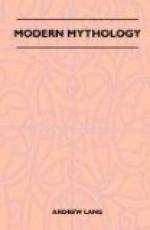Mr. Max Muller defends, with perfect justice, the existence of abstract ideas among contemporary savages. It appears that somebody or other has said—’we have been told’ (i. 291)—’that all this’ (the Mangaian theory of the universe) ‘must have come from missionaries.’ The ideas are as likely to have come from Hegel as from a missionary! Therefore, ’instead of looking for idols, or for totems and fetishes, we must learn and accept what the savages themselves are able to tell us. . . . ’ Yes, we must learn and accept it; so I have always urged. But if the savages tell us about totems, are they not then ‘casual native informants’? If a Maori tells you, as he does, of traditional hymns containing ideas worthy of Heraclitus, is that quite trustworthy; whereas, if he tells you about his idols and taboos, that cannot possibly be worthy of attention?
Perception of the Infinite
From these extraordinary examples of abstract thought in savages, our author goes on to say that his theory of ‘the perception of the Infinite’ as the origin of religion was received ’with a storm of unfounded obloquy’ (i. 292). I myself criticised the Hibbert Lectures, in Mind; {116} on reading the essay over, I find no obloquy and no storm. I find, however, that I deny, what our author says that I assert, the primitiveness of contemporary savages.
In that essay, which, of course, our author had no reason to read, much was said about fetishism, a topic discussed by Mr. Max Muller in his Hibbert Lectures. Fetishism is, as he says, an ill word, and has caused much confusion.
Fetishism and Anthropological Method
Throughout much of his work our author’s object is to invalidate the anthropological method. That method sets side by side the customs, ideas, fables, myths, proverbs, riddles, rites, of different races. Of their languages it does not necessarily take account in this process. Nobody (as we shall see) knows the languages of all, or of most, of the races whose ideas he compares. Now the learned professor establishes the ‘harm done’ by our method in a given instance. He seems to think that, if a method has been misapplied, therefore the method itself is necessarily erroneous. The case stands thus: De Brosses {117a} first compared ‘the so-called fetishes’ of the Gold Coast with Greek and Roman amulets and other material objects of old religions. But he did this, we learn, without trying to find out why a negro made a fetish of a pebble, shell, or tiger’s tail, and without endeavouring to discover whether the negro’s motives really were the motives of his ’postulated fetish worship’ in Greece, Rome, or Palestine.




